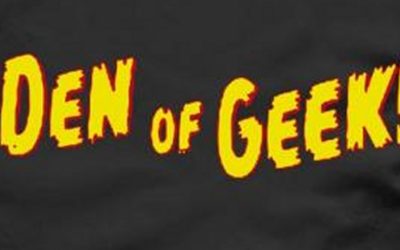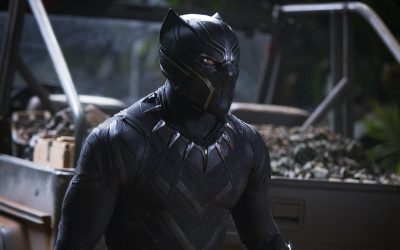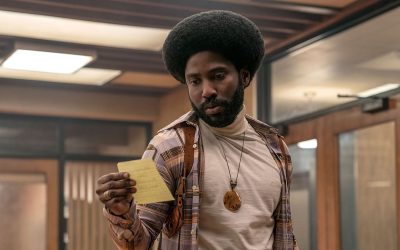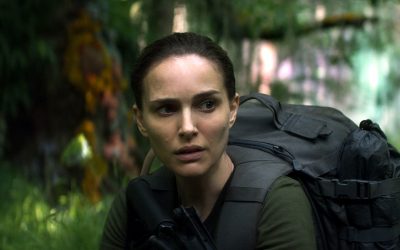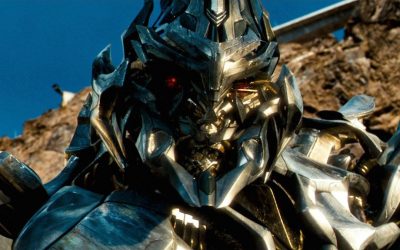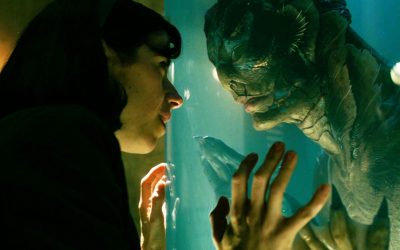
Holmes & Watson review: the game’s a-fudged
From Will Ferrell, John C. Reilly, and er… the director of Get Hard, Holmes & Watson is an underpowered Sherlock spoof.
Hooray, it’s the annual return of the “Mark Strong, But” game! Holmes & Watson is a comedy that reunites Will Ferr…
Outlander season 4 episode 8 review: Wilmington
Kayti Burt
Dec 24, 2018
Did Jamie just endanger the American Revolution? Spoilers ahead in our review of the latest Outlander season 4 episode…
This review contains spoilers. See related
…
Geeks Vs Loneliness: Happy Christmas and a peaceful New Year
Jane Roberts
Dec 25, 2018
Wishing everyone season’s greetings on behalf of everyone at Den of Geek
Hello and welcome to a special GvL here on Christmas Day. We wanted to take a moment to wish everyone a wonderf…
Pleasantville at 20: fandom, nostalgia, and identity
Mark Harrison
Dec 24, 2018
Pleasantville is a big-screen treatment of small-screen nostalgia. We look back at an underappreciated gem.
This feature contains spoilers for Pleasantville. See related
…
Den of Geek’s top 20 movies of 2018 – No 2: Black Panther
Ryan Coogler turns King T’Challa’s homecoming into one of Marvel’s biggest – and most important – success stories
One of the reasons Marvel Studios excels in its field is because the company can take virtually any character and distil their essence into something that makes even non-fans see what’s cool about them. Case in point: Black Panther, who has spent decades as a C-lister in the comics and yet closes 2018 with the year’s second-highest worldwide box-office gross. That’s not just smart craft: that’s close to magic.
Set in the hidden world of Wakanda, Black Panther told the story of the newly-crowned King T’Challa (Chadwick Boseman) and his battle to defend the throne – and the world – from would-be usurper Erik Killmonger (Michael B. Jordan). With a cast including Academy Award-winning talent such as Lupita Nyong’o (as Nakia), up-and-comers like Letitia Wright (as Shuri) and elder statespeople Forest Whitaker and Angela Bassett (as Zuri and Queen Ramonda respectively), it’s no surprise that every scene of the film crackles with talent.
Of course, Black Panther had a lot going for it beyond its cast. Unique afro-futurist visuals realised on a scale never before seen in mainstream cinema. A score by Ludwig Göransson that sounds like nothing you’ve heard attached to an action movie. The Marvel stamp of quality that puts audiences at ease with unfamiliar worlds before they’ve even walked into the cinema.
But perhaps best of all, it was that rarest of things: a superhero movie with something important to say about the world today.
After all, any blockbuster that culminates with the villain reminding audiences of atrocities committed in the name of the slave trade isn’t giving anyone an easy ride. Black Panther’s many layers of commentary on racial history and politics are all the more rewarding for being wrapped up in an easily-digestible and utterly gripping superhero story. It makes you laugh, it makes you gasp, it makes you think. What more can you ask for out of a movie?
It was director Ryan Coogler (Fruitvale Station, Creed) who brought the project to life, and it’s fair to say his work exceeded expectations to the point where Marvel reportedly refused to entertain a sequel without him, confirming nothing until their director of choice was on board and happy. It’s easy to see why that level of respect was afforded him: not only did the movie run and run, it brought audiences back multiple times to the point where it actually did better business than Avengers: Infinity War in the US domestic market. It’s hard to overstate just what a triumph that is. Both of these movies were a phenomenon, but it was only expected of the latter.
Ultimately, it became such a cultural phenomenon that the Black Panther’s rallying cry of “Wakanda forever!” and the cross-armed salute that accompanies it actually entered the cultural vernacular, imbued with all the meaning the characters attach to the gesture in the fictional universe. It’s one thing to make a great movie, but when ideas cross over to that extent, you’ve actually changed the world.
Den of Geek’s top 20 movies of 2018 – No 5: Blackkklansman
Rosie Fletcher
Dec 27, 2018
Spike Lee’s thrilling, terrifying true story is an awards frontrunner
The highest-ranking movie on our end of year list that isn’t a superhero movie or part of a franchise, Blackkklan…
Den of Geek’s top 20 movies of 2018 – No 6: A Quiet Place
Rosie Fletcher
Dec 26, 2018
John Krasinski’s high-concept horror stealthy snuck into our top 10…
Until 2018, John Krasinski was best known for the US version of The Office and being married to Emily Blunt, wi…
Den of Geek’s top 20 movies of 2018 – No 7: Annihilation
Alex Garland’s Netflix sci-fi is up there with the best of what the genre can offer
I love sci-fi, and even as someone in the midst of a lifelong love affair with sci-fi, I can admit that the majority of sci-fi movies come to us deeply flawed. Some of them can be absolutely filled to the brim with ideas, but budget restrictions, casting issues, or other production problems get in the way of a studio delivering a piece close to perfect. Sometimes, the filmmaker’s vision just outstrips the practical side of makin’ movies.
At the start of 2018, Alex Garland’s Annihilation arrived fully formed on Netflix UK and not in nationwide cinemas as we’d expected, for infuriating reasons. And unlike The Cloverfield Paradox, another big 2018 sci-fi outing that befell a similar fate, it was essentially a masterpiece filled with unexpected set pieces and zoological nightmare fuel, which made the decision to dump it on the streaming service seem colossally unfair.
Truly, though, Annihilation is just not for everyone, least of all audiences that require a little more PEWPEWPEWBANGBANG for their buck, so maybe its fate to become a cult classic was already sealed long before it landed on Netflix.
It’s also an oddity the likes of which we don’t see too often these days. Somehow a step up from the also-fantastic Ex Machina, Garland’s follow-up film flows over you in the weirdest way, like someone fed half a Capcom game into Google Deep Dream and asked it to recreate the feeling of being lost as a moving album cover.
The director made an arguably solid choice to keep his adaptation of Jeff VanderMeer’s “unfilmable” novel virtually explanation-free, but again, this was infuriating for plenty of people. The story of Lena (Natalie Portman), a cellular biology professor looking for answers after her husband (Oscar Isaac) falls ill on an expedition to “The Shimmer” – an electromagnetic anomaly that is slowly expanding to swallow up more and more real estate – might well be one that is always questioning, but it never appears unsure of its path.
In fact, Annihilation is up there with the best of what sci-fi can offer. It doesn’t signpost its weirdness, or spoon-feed you answers. It allows you to go on a journey into the unknown with Lena and see some of your own intangible elements adapted, refracted and reflected back from the screen, and so, when watching the film, everyone is capable of having a different experience.
Lena’s research girl gang of Dr. Ventress, Josie, Cassie and Anya succumb to The Shimmer in various ways as she’s quickly pushed into a confrontation with the strange entity at its core, but she remains an almost passive observer for the most part, even as the phenomenon mutates and hybridises every organism it envelops – and the same can be said of us.
For some people, Annihilation is a meditation on self-destruction. For others, it’s all about grief. For me, the choice to allow five female characters in important stages of their lives be at the centre of this strange universe made me wonder how much of our time, our nature, and of nature itself, is altered by events out of our control.
The film ends with as much uncertainty as it holds at the outset. It doesn’t really fully explain what has happened in the past, what is happening in the present, or what will happen in the future. It’s open to interpretation, even as its anchor remains in the grips of science.
Perhaps the one thing I feel most certain about is this: Annihilation will remain an important entry into the genre for decades to come, and everything else is inside the bubble.
Travis Knight on why Megatron isn’t in Bumblebee
The director of the Transformers spin-off explains why the infamous G1 baddie didn’t make the cut…
Director Travis Knight (Kubo And The Two Strings) looks set to reinvigorate the Transformers franchise with his ’80s-set prequel/spin-off, Bumblebee. A fan of the original, “Generation 1” animated series, Knight has also taken the opportunity to take the film series back to basics, “streamlining” his robots-in-disguise designs and including cameos for some of the cartoon’s classic characters.
But while Autobot legend Optimus Prime puts in an appearance, there is one particular robot who’s conspicuous by his absence – the villainous Decepticon leader Megatron. According to Knight, though, he was originally intended to be in the film.
“There was an iteration earlier on, where we actually did see Megatron in a scene that is no longer in the film, frozen in the Hoover dam,” the director tells Den of Geek when we catch up to talk all things Bumblebee.
“Because our film is so self-contained and essentially it presupposes no knowledge of the Transformers, one of the things I was trying to do was leave little things for the fans that didn’t get in the way of someone coming in and not knowing anything about the Transformers, that would get in the way of their appreciation and understanding of the film.”
“Sometimes you push your own little fetishistic thing a little too far and people will be like, ‘I don’t know what’s going on? What the hell is that thing? Who’s that?’ and that was the case with the Megatron scene, where we see him frozen in the dam,” Knight continues. “People just didn’t get it – people who weren’t Transformers fans, they just didn’t understand what was going on. So we had this awesome G1 Megatron frozen in hoover dam that, alas, didn’t make the cut!”
Bumblebee opens in cinemas on 26 December. You can read our review here.
Den of Geek’s top 20 movies of 2018 – No 9: The Shape Of Water
Guillermo del Toro hits new heights with this beautiful, heartbreaking fantasy romance
Not arriving in the UK until February 2018, after gracing many US best-of lists at the end of 2017 thanks to a disparity in the release dates, The Shape Of Water may find itself lost in the shuffle in some 2018 wrap-ups. The film has already shifted from big screen event to DVD in regular rotation at DoG HQ.
Writer/director Guillermo del Toro is a Den of Geek favourite and we were rooting for him following the disappointing response to the wonderful and still grossly underrated Crimson Peak. Not only did del Toro deliver something special with The Shape Of Water, but he found massive, well-deserved success, too. The film returned just under $200 million at the box office and took home the best film award at the Oscars, with del Toro taking the best director award for himself.
The Shape Of Water is a would-be sequel to Jack Arnold’s 1954 Universal monster classic Creature From The Black Lagoon (some years earlier del Toro had been working on a remake). Elisa (Sally Hawkins) is a cleaner at a secretive government facility. It’s here that she meets the creature (Doug Jones), captured from the lagoon and held by the US government. They soon bond, finding ways to communicate, but shady agent Strickland (Michael Shannon) intensifies his cruel experiments on the captive amphibian man, and Elisa recruits co-worker Zelda (Octavia Spencer) and neighbour Giles (Richard Jenkins) to help her attempt a daring rescue. Then she fucks the fishman.
Guillermo del Toro has authored a film that is rich in subtext, romance and beauty. The Shape Of Water is a remarkable film. It’s a different type of film to the comic-book action movies that account for so much of modern geek culture, but a tale about outsiders told in the language of classic cinema is a welcome addition to the geek cinema landscape.
There’s so much to talk about when explaining what we love about The Shape Of Water that it can be difficult to know where to start. The characters seem as good a place as any.
A wonderful collection of outcasts, the heroes of The Shape Of Water are disempowered and isolated. Elisa is afflicted with an injury that prevents her from speaking, making a labour of communication and separating her from those around her. Zelda is ignored by her husband. Giles’ homosexuality has cost him his job and forced him into an unhealthy relationship with pie. The cast, of course, are uniformly brilliant (Sally Hawkins’ performance in particular really warrants its own article).
The themes of communication and kindness all come alive with the heroic trio. The story of the decidedly villainous Strickland is mesmerising in its own right. Strickland has an important job, a wife and two children (a boy and a girl), a picturesque house in a sunny suburb and he’s even thinking of getting himself a shiny new automobile. Yet, Strickland is a cruel and unfulfilled man. As the film enters its tense and thrilling conclusion, the hand steering the wheel of Strickland’s brand new Cadillac is seeping pus and rotting.
The Shape Of Water is a story about a creature and a monster. Michael Shannon is phenomenal in the role, his turn bombastic and chilling.
Every element of the film feels polished, like it’s been worked and worked until it’s exactly right. There’s the canny decision to set the film in the 1960s, allowing for social comment and contributing to the wonderful look. The pacing is just right, in that things move along at a good speed but it’s not too tight. The Shape Of Water is a sweet, sad film that needs to be sat with and felt, and del Toro wisely gives it just enough air to allow you to without bloating out the runtime. It’s even laced with the director’s trademark fairytale allusions. It’s also important to mention the effects work, all brilliant and achieved on a tight budget.
It is Guillermo del Toro’s best film yet and has been worthy of every plaudit it has received to date. The Shape Of Water is inventive, beautiful and heartbreaking cinema.



